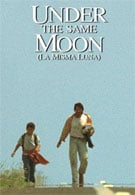Millions of Mexican women illegally emigrate to the United States each year, and at least four million of them leave children behind in Mexico. That statistic is even more heartbreaking when you realize the life they find when they come here: poor-paying jobs, few legal rights, and a constant fear that immigration services will arrest or deport them..
La Misma Luna/Under the Same Moon treats this reality with a huge dollop of sentimentality, telling the unlikely story of a young boy who crosses the border to find his mother, living in Los Angeles. The movie takes place in a world in which most strangers mean well and kind hearts win out over harsh reality, but it also takes care to explore the manifold challenges of simply existing in this country as an illegal immigrant. La Misma Luna has no political agenda other than to advocate compassion for all, but its careful consideration of a tricky situation puts it a touch above a straight-up melodrama.
Rosario (Kate del Castillo) left Mexico four years ago to seek a better life in Los Angeles, leaving behind her young son Carlitos (Adrian Alonso), now nine, in his grandmother’s care. She calls Carlitos each Sunday at 10 a.m. sharp on a pay phone in the village square, describing for him in detail everything from her Los Angeles neighborhood to her jobs as a housekeeper and a nanny. Carlitos works a side job for a local woman who organizes illegal emigration to the U.S., but he’s waiting until his mother can get him legal papers. But when Carlos’ beloved grandmother dies, he decides to strike out on his own journey to L.A., hoping to make it before his mother calls on Sunday morning and discovers he’s gone.
Carlitos spends all his money to hire a young American couple (one of them being Ugly Betty star America Ferrera) to smuggle him across the border, and must hitchhike and rely on strangers for the rest of his journey. He is in real danger several times, but eventually Carlitos winds up traveling alongside a grizzled migrant worker named Enrique (Eugenio Derbez). Enrique can scarcely put up with Carlitos but is stuck with him, and gradually resolves himself to help Carlitos on his journey. BR>
As Carlitos make his way toward her, Rosario begins a tentative flirtation with Paco, a kind security guard, and gets fired from her housekeeping job, forcing her to reconsider her purpose in Los Angeles to begin with. She is torn between marrying Paco, an American citizen, in order to obtain a green card for herself and Carlitos, or simply returning to Mexico to reunite with her son.
Screenwriter Ligiah Villalobos isn’t terribly interested in the moral gray areas of the story —the characters are either single-mindedly good and well-meaning, like Carlitos, Rosario and Paco, or evildoers trying to take advantage of immigrants, like a drug dealer who tries to sell Carlitos to child traffickers or Rosario’s employer who tauntingly reminds her that she can’t call the cops for fear of being deported. Only Enrique strays from this dichotomy, as he shifts from trying to strike out on his own and abandon Carlitos to sacrificing himself in order to help him. It’s not the most subtle character transition, but Derbez’s finely tuned sarcasm helps temper the sentimentality that threatens to take over from time to time.
Filmed in various Mexican locations, La Misma Luna has a good feel for its geography and characters, aided greatly by an able and sympathetic cast of well-known Mexican actors. Alonso is a uniquely charming child star, rarely mugging for the camera and exuding the kind of bizarre confidence it would take for a nine-year-old boy to undertake this journey. He and Derbez make a great team, and though Alonso shares no scenes with his on-screen mom Castillo, the two forge a palpable bond.
In the end La Misma Luna earns less credit for its far-fetched and sugary story than its willingness to tell this story to begin with. Though few children will illegally emigrate to the U.S. on their own, many are living without their mothers, just like Carlitos. At a time when tensions between Americans and illegal immigrants are rising, a universal story like this one is a moment to step back and recognize, yes, we’re all under the same moon. Schmaltz and sentimentality aside, it’s a message worth remembering.
Staff Writer at CinemaBlend
While We Wait For Iman Vellani’s Ms. Marvel Return, I’m Jazzed She’s Joining An Upcoming Movie’s All-Star Cast That Includes Seth Rogen, Woody Harrelson And More
Tom Cruise, Simon Pegg, And Hayley Atwell's Freezing M:I 8 Shoot Looks Honestly Painful, But I Think One Adorable On Set Perk May Have Made It Worthwhile












